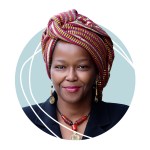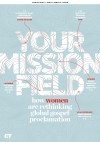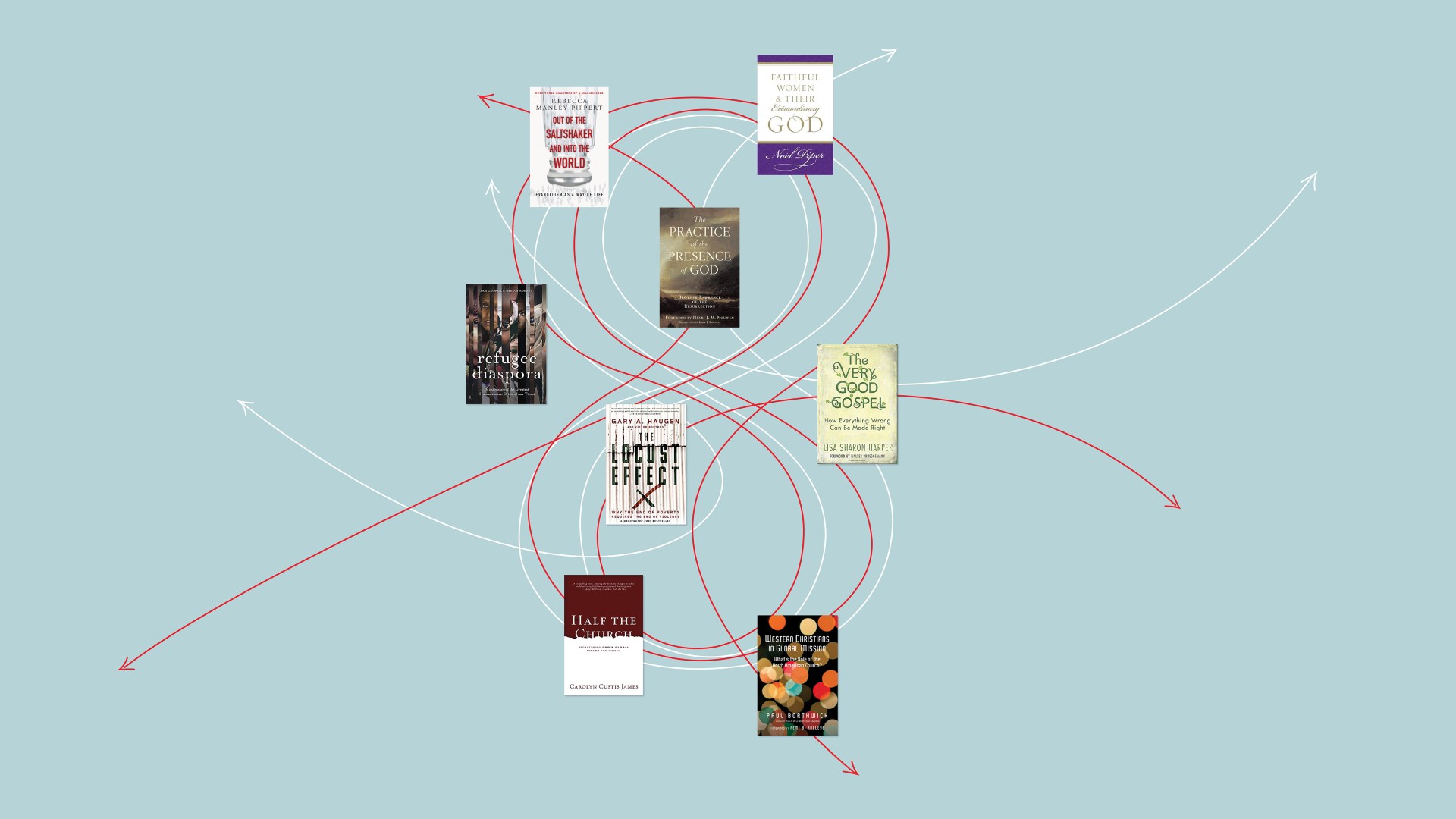Leaders in missions, missiology, evangelism, and global ministry reveal the titles that shaped their vision and equipped them to better proclaim the gospel.
Out of the Salt Shaker & Into the World: Evangelism as a Way of Life by Rebecca Manley Pippert (InterVarsity Press)

I first came across Out of the Salt Shaker & Into the World as a student in Brazil. It had a huge impact on me because it addressed my biggest obstacle when sharing Jesus with my friends: fear of rejection. Pippert encourages us to be authentic with our friends and dependent on Jesus. Little did I know how this was going to be crucial to the calling God had for my life. As I now travel across Europe training students in evangelism, fear of rejection is still the number one obstacle for students, just as it had been for me. This book is a must-read for any Christian who desires to be salt and light in their context. It teaches us how to partner with God in what he is doing in the lives around us, equips readers with communication skills to have natural conversations, and calls us to depend on the Holy Spirit in his work of salvation.
—Sarah Breuel serves as director of Revive Europe, evangelism training coordinator for IFES Europe, and as a member of the Lausanne Movement’s board of directors.
Faithful Women and Their Extraordinary God by Noël Piper (Crossway)

Faithful Women and Their Extraordinary God offers the church two needed narratives. The first is a theology of suffering and risk. Christians are a called and sent people. This book helps us understand that suffering is part of our story. The second narrative is the gifting and calling of women in God’s mission. The women featured in this book were powerfully used by God to spread his gospel and build his church. They taught, they shepherded, they led, they served, and they blazed new and difficult trails.
This book challenged me to consider what sacrifice, risk, and suffering look like when making a bold stand for Jesus. Each of these women made huge sacrifices in being obedient to God’s call. They persevered despite unimaginable suffering and trauma. They did not lose their faith; rather, they clung all the more tightly to their Lord. This book teaches us what it means to be wholly dependent on God and to remain faithful to him, no matter the circumstances.
—Michelle Atwell is the U.S. director of SEND International.
The Locust Effect: Why the End of Poverty Requires the End of Violence by Gary Haugen and Victor Boutros (Oxford University Press)

When I started reading The Locust Effect, I was immediately heartbroken. It begins with the story of “Yuri,” an 8-year-old Peruvian girl who was raped and murdered. Yuri’s family had no financial means to bring her killer, the son of a wealthy family, to justice. The police were bought off. There was never even a trial. Like Yuri, millions of the world’s poor are the silent victims of rape, murder, forced labor, and broken justice systems. This book challenged me to see the ugly underside of poverty, especially as my colleagues and I at Compassion International pursue our mission of releasing children from poverty in Jesus’ name.
The church and many other organizations are behind life-changing efforts to alleviate poverty by addressing physical, social, educational, and spiritual needs. Countless lives are being saved and improved through these efforts, but much of this work is undermined when the global poor are subjected to such violence. For me, it’s all about urgency. This book is a wake-up call for the church to rise up and take a more prominent role in protecting the vulnerable poor.
—Elizabeth Uriyo serves as the senior vice president of Compassion International’s Global Leadership Office.
Refugee Diaspora: Missions amid the Greatest Humanitarian Crisis of our Times by Sam George and Miriam Adeney (William Carey Publishing)

This book features real-life accounts of refugees who encountered Jesus through the intentional hospitality and care of the global church. It challenged me to consider how a well-developed theology of hospitality can transform lives.
Refugee Diaspora looks at the current refugee crisis through the lens of opportunity; namely, opportunities to be involved in caring for displaced persons in one’s community. It introduces us to real people, not just “refugees ”(which has become a broad category devoid of any personal characteristics). The stories transport the reader to different regions of the world where harrowing journeys are met with miraculous moments that transform lives.
“Learning the art of biblical hospitality is a lifelong discipleship matter,” write the authors. “It requires a longing to reflect God’s heart for the marginalized in our world.” This book helps readers understand how God is moving in the midst of the current refugee crisis and how we can be involved in that movement.
—Jamie N. Sanchez is assistant professor and director of the PhD program in Intercultural Studies at Biola University.
The Very Good Gospel: How Everything Wrong Can Be Made Right by Lisa Sharon Harper (WaterBrook)

This quote in The Very Good Gospel stopped me in my tracks: “If one’s gospel falls mute when facing people who need good news the most—the impoverished, the oppressed and the broken—then it’s no gospel at all.” It caused me to take a deep, hard look at my life and ask myself: Is the Good News of the gospel evident in my life and to those around me, specifically the poor, broken, and oppressed?
The book’s central theme of shalom has changed the way I engage in the work of justice. Shalom calls us beyond just fixing the immediate situation; shalom invites us to ask ourselves, What would it take for everyone to flourish? It’s easy to get caught up in a savior complex when you’re engaged in missions or justice work, but shalom requires us to remember that we are all connected—that when my sister is suffering, I too am suffering. The Very Good Gospel invites us into the redemptive work of God seeking to restore our broken relationship with God, humanity, and the earth.
—Chi Chi Okwu is a senior church advisor for World Vision.
Half the Church: Recapturing God’s Global Vision for Women by Carolyn Custis James (Zondervan)

As I have equipped women in the U.S. and abroad over 30 years, I felt concern about how our theological conversations didn’t seem to adequately address how Creation and redemption engaged women in their full dignity as kingdom servants, nor how the Fall and human brokenness contributed to women’s extensive suffering in many cultures around the world. Half the Church was an answer to prayer for me. Through exploration rather than debate, James offers thoughtful biblical work and fresh language that lends breadth and depth to our understanding and practice regarding women and men as God’s “blessed alliance” in the world.
As I’ve led peer-learning discussions with men and women from across the evangelical spectrum, this book has been a launching point for productive, respectful, transforming conversation. We can process together—agreeing and disagreeing as we go—and all move closer to being the people God desires us to be. Redeemed men and women are both freed to be the kingdom-people God intends, bringing that Good News into the cultures we serve so that his will is done “on earth as it is in heaven.” Half the Church gives women a greater sense of our identity as God’s daughters, and our calling as with the men in our lives, so that we all live out Jesus’ call to follow him.
—Wendy Wilson is Missio Nexus’s mission advisor for the development of women and founder of Women’s Development Track.
The Practice of the Presence of God by Brother Lawrence

When I got this little book as a postgraduate student in Thailand in 1986, I was inspired by the life of Brother Lawrence and how he practiced the presence of God. It made me realize that I could talk to Jesus in simple ways, in heart-to-heart conversation with him. This book remains my key inspiration. When I spend time with the people I work with, Jesus is with me. He is always my companion.
At World Hope, we work among the most discriminated against sections of society. I work closely among the rural poor communities of Cambodia, Laos, Myanmar, Thailand, Vietnam, Indonesia, Nepal, and Bangladesh. When I go to the mountains among an ethnic-minority community, Jesus is with me. When I listen to the hurts and pain of people discriminated against by society, Jesus is with me. I can sense the love and compassion of God when I spend time in these communities, meeting survivors of human trafficking, gender-based violence and sexual exploitation, and other marginalized populations. Brother Lawrence's prayer, “Lord, I cannot do this unless Thou enablest me” has also been true for me.
I recommend this book to all Christians, and especially to those who’ve been in ministry for many years and feel tired or burnt out. This little book is like a match to light the candle we need to carry in our journey with Jesus.
—Emelita Goddard is director of community development and agriculture for World Hope International.
Western Christians in Global Mission by Paul Borthwick (InterVarsity Press)

I was introduced to Western Christians in Global Mission as a student in the School of Intercultural Studies at Fuller Seminary and while serving as an executive with Wycliffe Bible Translators (USA). One theme throughout the text is Borthwick’s love for the church—both the North American church and the majority world church—a love that is too great to let either get a free pass when it comes to the issues and challenges each brings. Borthwick helps realign our Western thinking about ministry partnerships to a more helpful and accurate model.
Today, I lead Urbana, a conference with the vision of seeing this and every student generation give their whole lives to God’s global mission. One question I’ve been asking with renewed passion is how we can more effectively model and call people to humility in serving cross-culturally. Borthwick shines a glaring light on a reality that makes me uncomfortable in a good way. He states that, too often, we who serve on cross-cultural short-term missions practice self-congratulatory servanthood. Ouch! Borthwick’s litmus test for true servanthood is serving people in a way that they interpret as servanthood.
—Ruth Hubbard serves as director of Urbana and as a vice president of InterVarsity Christian Fellowship.

This article is part of CT’s special issue on how women are rethinking global gospel proclamation. Download a free pdf of the issue at moreCT.com/YourMissionField.


















